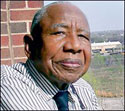Black survivors demand reparations
By
Monica Moorehead
Published Mar 16, 2005 1:11 PM
“The morning that the riot started
we heard the shooting... just a couple of blocks from the end of Greenwood on
Archer. After we heard the shooting,
I came to... Jackson’s
Funeral Home.
It was also right on the end of Greenwood, a few doors
down. He (Samuel Jackson) had not been long purchasing a new ambulance... we
went to the undertaker... one of the young men that drove during the funeral
sessions was also going out to the garage to get the ambulance. There was a old
mill right across the tracks, right on Greenwood. You could look out of the
mill, they could look right over and see us. While the boy was trying to unlock
the door to get the ambulance... somebody white shot out... They were up in that
mill which was probably four or five stories high, and they shot out of that
mill and hit the boy on the hand... Blood shot out his hand. I’m standing
right behind him. He dropped the keys and we ran to the back part of the funeral
home by the dead folk.”
—Otis Clark
(tulsareparations.org)
The year was 1921. The place was
Oklahoma. And the incident—the Tulsa race riot. This event got next to no
notice when it happened almost 84 years ago, but for the survivors, like
102-year-old Clark, it’s like it happened yesterday.
On May 31,
1921, racist whites carried out a brutal attack against what was then known as
“Black Wall Street,” a segregated section of Tulsa where the Black
population established prosperous businesses. These racists killed and maimed
hundreds if not thousands of Black women, men and children, and burned almost
all of their businesses and homes to the ground.
None of the survivors
received any kind of apology, compensation or any public recognition that this
massacre happened.
It was 80 years later that the Oklahoma State
Legislature offered an official apology to the survivors based on a three-year
study on the massacre performed by a Tulsa Race Riot Commission that began in
1997.
|
African American detainees
being led by armed guard.
|
Lawyers, law students, members of the Congressional Black Caucus,
survivors of the massacre and other supporters held a news conference and rally
March 9 on the steps of the U.S. Supreme Court in Washington, D.C., to file a
petition with the court to demand long overdue reparations denied to the
survivors in the lower courts. Those in attendance included Clark, historian
John Hope Frank lin and Congress woman Maxine Waters.
A federal district
court dismissed the Oklahoma lawsuit in 2004, stating that the incident happened
too long ago for compensation to be granted.
Odinga Harrington from the
National Coalition of Blacks for Reparations in Amer ica told why she attended
the rally. “Repar ations are long overdue for the victims of the Tulsa
riots, and reparations are long overdue for the descendants of slaves throughout
the country.” (Amsterdam News)
Go to
www.workers.org/ww/1999/tulsa0610.php for more information.
Articles copyright 1995-2012 Workers World.
Verbatim copying and distribution of this entire article is permitted in any medium without royalty provided this notice is preserved.
Workers World, 55 W. 17 St., NY, NY 10011
Email:
[email protected]
Subscribe
[email protected]
Support independent news
DONATE


